SanDisk Extreme Pro SSD (240GB, 480GB & 960GB) Review: The Fastest Just Got Faster
by Kristian Vättö on June 16, 2014 4:00 PM EST- Posted in
- Storage
- SSDs
- SanDisk
- Extreme Pro
Random Read/Write Speed
The four corners of SSD performance are as follows: random read, random write, sequential read and sequential write speed. Random accesses are generally small in size, while sequential accesses tend to be larger and thus we have the four Iometer tests we use in all of our reviews.
Our first test writes 4KB in a completely random pattern over an 8GB space of the drive to simulate the sort of random access that you'd see on an OS drive (even this is more stressful than a normal desktop user would see). We perform three concurrent IOs and run the test for 3 minutes. The results reported are in average MB/s over the entire time.
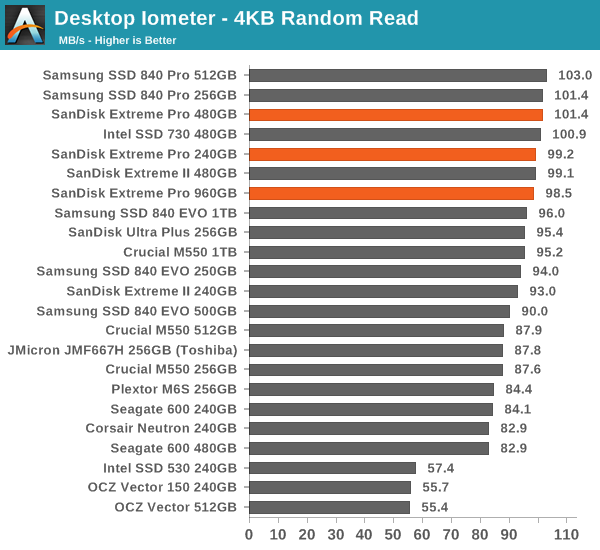
The random read performance is great, which was expected when coming from the Extreme II.
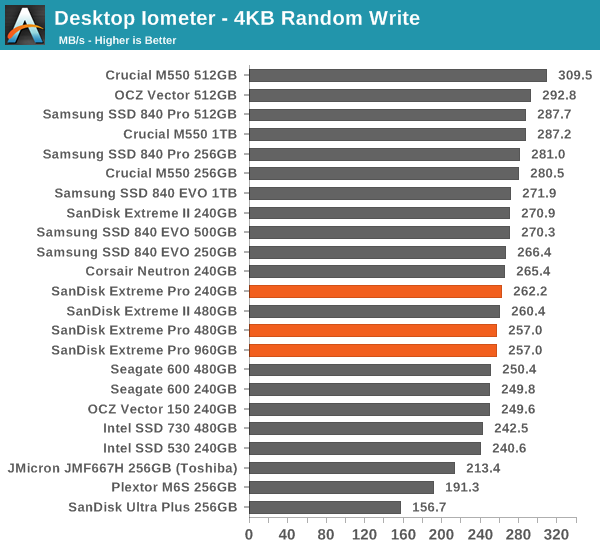
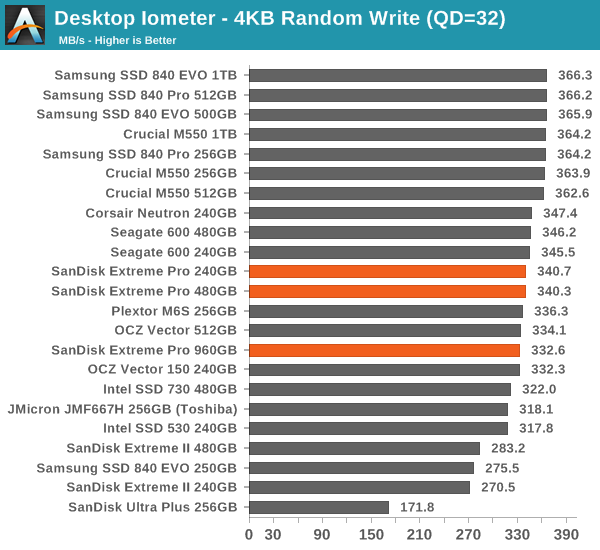
Random write performance, on the other hand, is only mediocre, although it's consistency that matters and not necessarily the peak performance. It seems that drives with high consistency do not have as good peak performance because the Extreme Pro, Vector 150 and SSD 730 are in the middle, whereas the 840 EVO and M550 lead the pack despite their relatively poor IO consistency. I would take consistency over ~10% better peak performance, though.
Sequential Read/Write Speed
To measure sequential performance we run a 1 minute long 128KB sequential test over the entire span of the drive at a queue depth of 1. The results reported are in average MB/s over the entire test length.
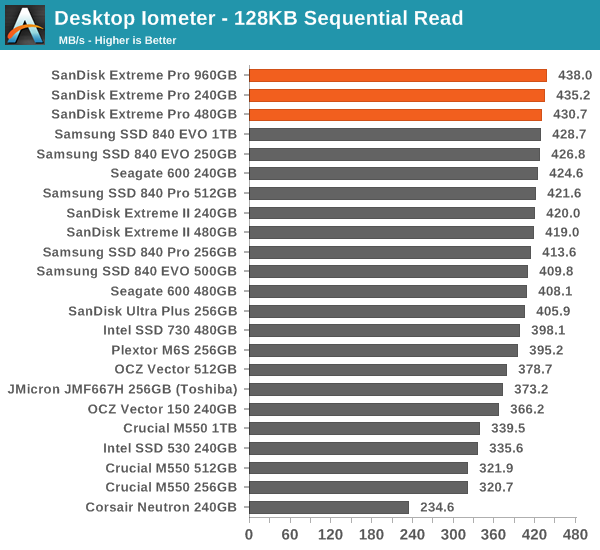
Sequential performance is definitely good. I think the high read speed is one of the reasons why the Extreme Pro did so well in the 2013 Storage Bench because both the SSD 730 and Vector 150 are noticeably slower.
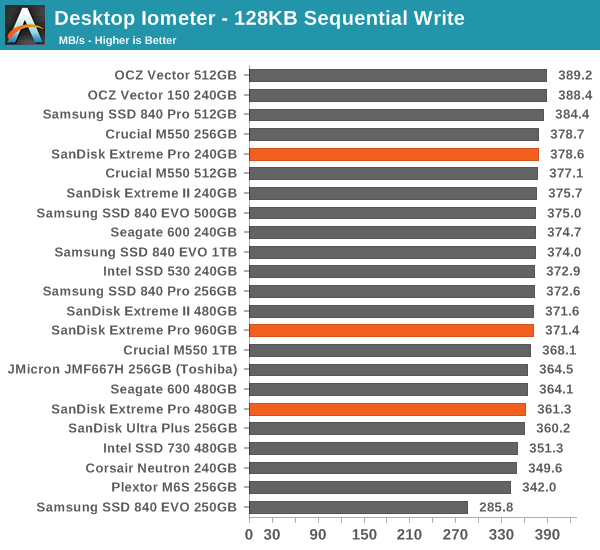
AS-SSD Incompressible Sequential Read/Write Performance
The AS-SSD sequential benchmark uses incompressible data for all of its transfers. The result is a pretty big reduction in sequential write speed on SandForce based controllers.
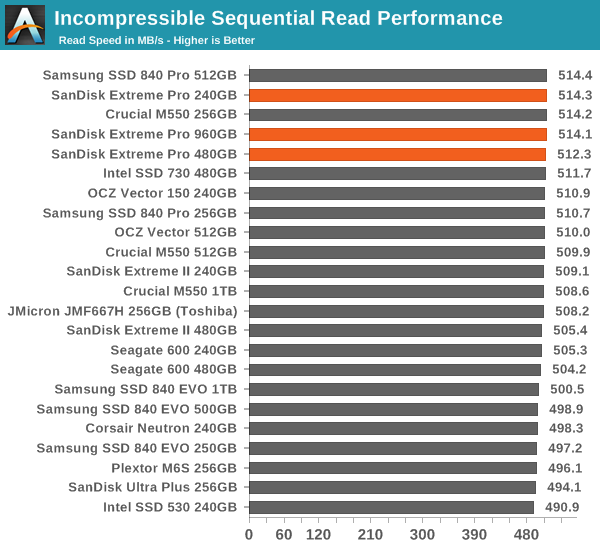
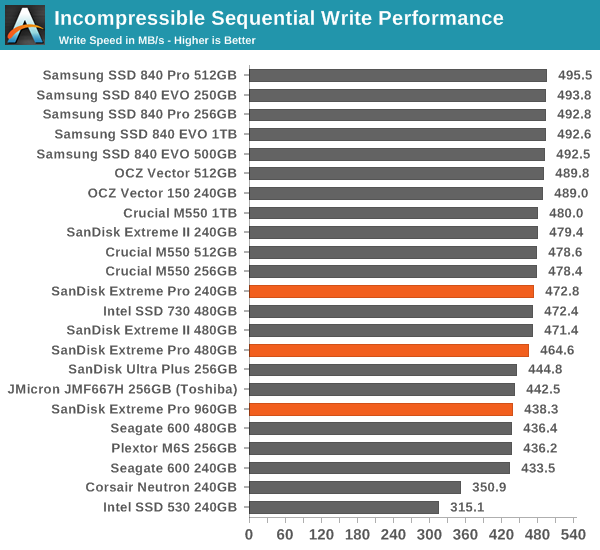










85 Comments
View All Comments
Kristian Vättö - Tuesday, June 17, 2014 - link
Unfortunately the tool we use doesn't allow the LBA range to be limited.uruturu - Wednesday, June 18, 2014 - link
:( I think would have been a head-to-head between Sandisk Extreme Pro, Samsung 840 Pro and Corsair Neutron GTX...sheh - Tuesday, June 17, 2014 - link
It's good to see also the lower capacity model performing well. I hope other manufacturers would do the same. But too bad there's no 120GB."SanDisk is betting that its target users will ... or the endurance limit will be hit after the warranty runs out"
Is the warranty not 10 years or 80TB, whichever comes first?
Kristian Vättö - Tuesday, June 17, 2014 - link
Yes. The warranty will be voided if you exceed the 80TB write limit.hojnikb - Tuesday, June 17, 2014 - link
wow, i never though there are products with 32!!! stacked dies.is there any specific product, that uses so much dies ?
prophet001 - Tuesday, June 17, 2014 - link
I was wondering why there was no mention of block size. Do you set the block size on these drives? If so, does it make a difference in the performance?Demon-Xanth - Tuesday, June 17, 2014 - link
What's going to keep PCIe SSD adoption low is the sheer number of systems that you can't just drop it in and boot in it's current state. What it will likely take is for the drives to ship with a legacy mode that says to BIOS "yeah... I'm a SATA RAID controller with a bunch of drives attached...". The latest EFI updates for NVE and Windows 8.1 are a great step forward though.zuiop - Tuesday, June 17, 2014 - link
Can somebody explain to me why in most SSD reviews the lack of encryption support is criticised? Of course you want encryption for your data, but why in the drive? It's a black box implementation that you can't fully trust or update, unlike the plenty of open source software solutions. Especially when talking about high performance drives, I'd expect the CPU to have hardware acceleration for encryption, so speed shouldn't be an issue afaict. Can anybody shed some light on this?Kristian Vättö - Tuesday, June 17, 2014 - link
Software encryption adds unnecessary overhead and thus degrades performance:http://www.anandtech.com/show/6891/hardware-accele...
I think I need to do an article that better describes the usefulness of TCG Opal because there are some security advantages as well. I admit that we probably haven't done the best to fully address this, but hopefully we can still fix it :)
zuiop - Tuesday, June 17, 2014 - link
Thanks for your reply. I'd love to see the article. I couldn't see from that linked article whether the CPU has AES NI or equivalent, my point is that I can't see why encrypting the data with such a CPU is inferior to drive side encryption. I'm looking forward to the article!